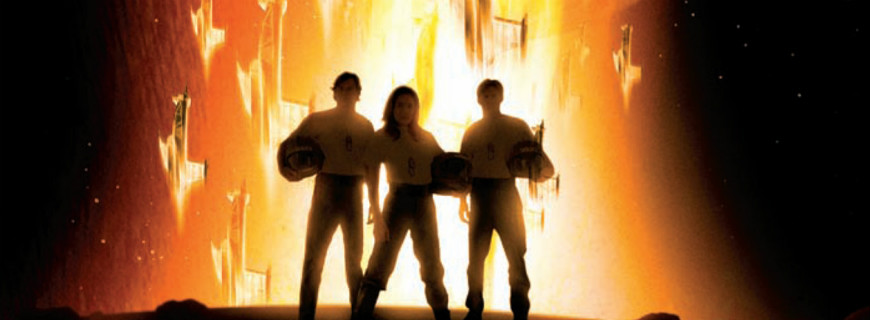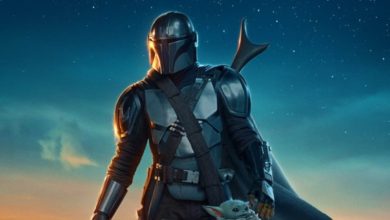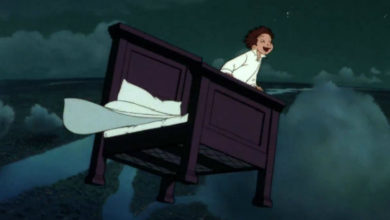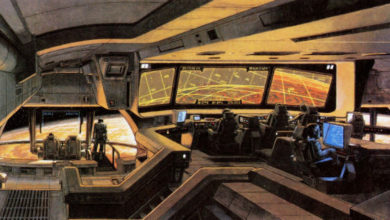Space Oddities: Who Monitors the Birds? (Winrich Kolbe, 1996)

Each month, Raz Greenberg reviews an overlooked piece of science fiction, fantasy or horror – be it a film, a television episode, a comic or a game – one that should have gotten more attention when it first came out and should still be remembered, in his opinion. This month, he goes back to a largely forgotten yet highly influential TV episode from the early ’90s.
In the mid-1990s, The X-Files made a big splash and suddenly genre shows became a hot prime-time commodity. Supernatural investigators, psychics and time travelers became a common sight on the TV schedule, and many veterans of Chris Carter’s show found themselves running their own shows. Shortly before this genre-boom, when The X-Files was slowly turning from a small cult-phenomenon to mainstream hit, the show’s most talented writers Glen Morgan and James Wong left it to head their own project. It was called “Space: Above and Beyond”, and it lasted for a single season between 1995 and 1996.
The show followed members of a marine squadron recruited in 2063 to fight an alien race which declared war on humanity just as the latter was making its first steps into space colonization. One of the most interesting aspects of the show’s futuristic setting was the existence of InVitroes – human being created artificially in tanks, originally as soldiers in a previous conflict which involved humanity. Treated as second-class citizens who often suffer prejudice, many InVitroes have loyalty issues with other humans. And it is into this background that the show introduced two In Vitro protagonists: the confident squad leader T.C. McQueen (played by the amazingly talented James Morrison) and the rebellious young punk Cooper Hawks (played by Rodney Rowland).
Who Monitors the Birds was the show’s 12th episode, written by Morgan and Wong and directed by Winrich Kolbe (a veteran of space-opera TV shows whose credits went all the way back to the original Battlestar Galactica). At this point, it was clear that the InVitro/Human relationship was the show’s most popular elements, and its creators felt comfortable with experimenting, taking the audience deep into the tortured mind of an InVitro character. In the episode, Hawks goes on a secret mission to kill a high-ranking alien officer. The mission is successful, but Hawks finds himself stranded on a hostile alien planet, waiting for an extraction that may never come. While running for his life and trying to survive, Hawks begins losing his grip on reality as flashbacks, hallucinations and nightmares haunt him.
From an early point, the show has portrayed war as a non-heroic, tragic affair, but Who Monitors the Birds took things to a new hellish level. Directed with almost no dialogue, the episode reveals the story of an adult person who has been living for only six years, all of them a constant struggle for survival. In the course of the episode, viewers learn the only purpose Hawks ever had in his life was killing, and the nightmarish voyage he goes through in the episode can be seen as an attempt to find a meaning beyond this purpose – a failed attempt, as hinted by the episode’s low-key conclusion.
The episode represents Kolbe’s direction at its top form: at times, the episode feels like a single long breathtaking action scene, and while keeping the use of CGI and even props to the minimum, lighting and camerawork do an excellent job in giving the natural environment where the episode was shot an alien feeling. Rowland delivers an excellent performance that gives his character significant depth beyond the “bad boy” character he portrayed in previous episodes, and the intense experience that this character goes through in the episode is in many ways reflective of Rowland’s own ordeal – he suffered some serious injuries during production.
Like most previous (and future) attempts at a prime-time space opera show on a big network, Space: Above and Beyond did not survive beyond a single season, and though it never managed to establish a big enough fanbase as other prematurely cancelled shows, it had significant influence on subsequent productions. Joss Whedon has expressed his appreciation of the show, employing many members of its technical staff on the early seasons of Buffy the Vampire Slayer, and referring to specifically to Who Monitors the Birds as an inspiration for the silent episode Hush (he later also cast Rowland in an episode of Angel). The show’s grim portrayal of futuristic military action, especially the use of dimly-lit sets has been widely imitated in the military-themed episodes of Deep Space 9 (many of them directed by Kolbe), Whedon’s own Firefly, the re-imagined Battlestar Galactica series and the Alien Resurrection film (also written by Whedon*), which even used some props and set pieces originally created for Space: Above and Beyond.
Where to get it: DVD sets that collect all the episodes of Space: Above and Beyond are available in both the US and the UK. The US edition is a bare-bones release with no extras, so UK edition is definitely a better purchase, containing documentaries, productions sketches and commentaries on selected episodes (including, of course, “Who Monitors the Birds”).
* BTW, you can read my analysis of Alien Resurrection in the essays anthology Joss Whedon: The Complete Companion published by Titan.




